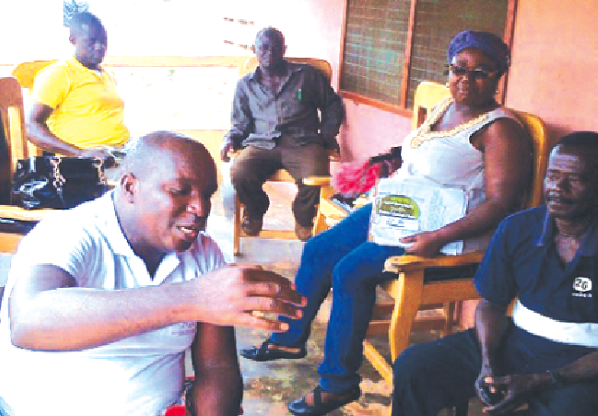
Lack of formalised processes for compensation negotiations affecting proof of legality of timber products
The days when active involvement of community members and farmers in the lumber business was dismissed as irrelevant, are long gone.
Advertisement
Current forest management practices and global instruments introduced to streamline activities within the sector requires particular attention to be paid to the needs and concerns of forest fringe communities.
For instance, under Ghana's Forest, Law, Enforcement, Governance and Trade (FLEGT) Voluntary Partnership Agreement (VPA) with the European Union (EU), one prove of the legality of timber products including logs is community engagement. With respect to off-reserve logging (ORL), the law requires compliance with negotiating, signing and implementing Social Responsibility Agreements (SRAs) and payment of compensation to farmers for damage caused to crops.
However, it has been revealed that no provisions and processes have been made to enforce such compliance. The case studies established that the non-availability of legal or operational guidelines and procedures for compensation negotiation and a simple methodology for compensation value estimation is to the disadvantage of farmers.
Meeting legal requirement
Moreover, the lack of a formalised procedure to document the entire negotiation process will render it difficult for loggers to show proof of meeting the legal requirements for compensation payment and for that matter proof of legality of their wood and wood products.
However, with the implementation of the VPA, the verification protocols will need to incorporate requirements for loggers to show paper documentation of compensation negotiation and payment.
The Case Studies were conducted as part of activities under the now ended Sustainable Forest Management Partnership-Ghana (SFMP-Ghana) initiative. It was funded by the EU through the Food and Agriculture Organisation (FAO).
The Case Studies were conducted in four selected communities namely Kwaku Dum in the Dunkwa Forest District, Kwaku Boa in the Asankragwa Forest District, and Akyem Subi and Akyem Amenam both in the Kade Forest District.
The purpose was to establish the effectiveness of operational guidelines in ORL in relation to roles and benefits sharing. It further sought to answer questions such as whether legality requirements relevant to the Ghana Legality Assurance System are being complied with and if not, what lessons can be learnt?
The Case Studies made several observations including non-documentation of compensation negotiations with the entire process being verbally-based. This means compensation values may not be fairly calculated and farmers may be cheated or the logger may overpay because of lack of tools for compensation estimation.
Another observation, which according to the case studies was one of the key barriers to the otherwise progressive VPA process, had been the lack of capacity of communities and farmers to assert their rights and roles in ORL – logging that occurs on farmlands in forest communities which affect food and cash crops at various stages of cultivation.
Some findings
The findings said inadequate knowledge of communities and farmers about their rights and roles in ORL was identified as undermining the entire process of compensation negotiations. Besides, the lack of information on SRA estimates affects the fairness of SRA packages by loggers to communities during SRA negotiations.
The findings noted that the situation where the Forestry Commission (FC) played no role in compensation determination and payment jeopardised the enforcement of compensation payment. This, according to the findings, “will result in loggers destroying crops without fair compensation or even actual payment to farmers.”
The Case Studies made several recommendations for the FSD of the FC, loggers and communities to follow in order to facilitate the process. Among the recommendations was the need for the FSD to step up its mandated role of controlling and monitoring activities including negotiation, signing and effective implementation of SRAs, before and after permits are issued.
Then, loggers need to update their knowledge on the FLEGT VPA and its effects for legal trade, SRAs for community benefit, compensation calculation and negotiation and record keeping. This is necessary to ensure their compliance with the requirements of the law and result in effective business operations.
Community members are to ensure that Social Responsibility Agreement (SRAs) are agreed on in writing, signed by all parties and handed only to those people who are supposed to receive it in representation of the community. Additionally, they should see to it that SRAs are based on consensus or majority decision and that SRAs are not imposed by chiefs or individuals.
Key forest sector officials such as the Executive Director of the FSD, Raphael Yeboah, are happy with the findings of the case studies, as they will help to move the VPA process forward.
His concern had been that even though remarkable gains have been made since Ghana and the EU signed the VPA in 2009, no VPA related licenses have been issued.
SFMP-Ghana is an alliance of six non-governmental organisations namely National Working Group on Forest Certification (WG), Rural Development and Youth Association (RUDEYA), the Kumasi Wood Cluster Association (KWC), Agri-business in Sustainable Natural African Plant Products (ASNAPP), Friends of the Earth-Ghana (FOE-Ghana) and Wassa Amenfi Traditional Council.
The initiative and activities implemented under it formed part of the EU FAO FLEGT Programme through which the EU is providing related technical assistance to implement projects that target aspects of the EU FLEGT Action Plan to address the presence of illegal timber in the global markets.



